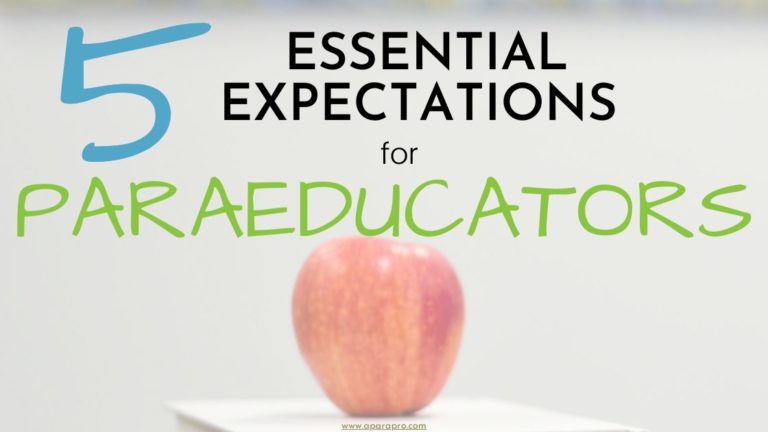Study Group Secrets: A Guide to Starting a Successful Paraeducator Exam Prep Study Group
Hey there, aspiring paraeducators! Are you looking to pass that paraeducator exam with flying colors? Well, we've got a secret weapon for you: study groups!
Studying can be a daunting task, especially when you're doing it alone. The isolation can make it difficult to stay motivated and focused. That's why many students turn to study groups as a way to enhance their learning experience.
If you are interested in becoming a paraeducator, I have the perfect blueprint for you.

If you are an aspiring paraeducator and are more extroverted and need a little socialization, then you should definitely consider joining a study group. Study groups can be a fun and invigorating way for you to improve your score and pass your exam.
If that's you, then let's explore the benefits of study groups, how to form one, and tips for making the most out of your study group sessions.
So, how does a study group work, you ask?
A study group is essentially a group of individuals who share similar academic goals and come together to study and learn from each other. The group provides a supportive and collaborative learning environment where everyone works together towards a common goal. Each member brings their own unique strengths and perspectives, which can help enhance the overall understanding of the subject matter.
If you have an exam coming up, study groups are a great way to make the learning process much more enjoyable and effective.
By joining a study group, you will be able to:
- collaborate with other students who are preparing for the same exam. This will give you the opportunity to share your knowledge, learn, and gain new perspectives on the material from others.
- Additionally, study groups can help you stay motivated and accountable. When you are part of a study group, you are more likely to stay on track with your studies and avoid procrastination as you are working towards a shared objective.
- Moreover, study groups can help you identify your weaknesses and strengths.
Overall, a study group can be a great way to improve your academic performance and build meaningful connections with like-minded individuals. As you prepare for your paraeducator exam, consider study groups as an effective way to prepare for it and improve your chances of passing with flying colors.
What is the goal of a study group?
The primary objective of forming a study group is to gain different perspectives and insights that can help an individual understand and retain a concept better. When you work with others, you get exposed to diverse ideas and opinions that can broaden your understanding of a particular topic. This collaborative approach to learning can also help you stay motivated and accountable. Often, in a study group, members set goals and deadlines for themselves and hold each other accountable for meeting them. This can help you stay focused and committed to your studies.
The goal is to enhance individual learning through group learning. When you work with others, you gain different perspectives and insights, which can help you understand a concept better. Plus, it keeps you motivated and accountable, enhancing individual learning and academic success.
So, is a study group a good idea?
Absolutely! As the saying goes, “Two heads are better than one,” and the same applies to studying. Studying alone can be boring and unproductive while studying with a group can be fun and effective.
It has been proven that working with others can lead to better results. When you study alone, you may get distracted easily or feel demotivated, but when you are part of a group, you can feed off each other's energy and motivation.
You can also learn from each other's strengths and weaknesses. For example, if you struggle with math, someone else in the group may be able to explain it in a way that makes sense to you.

Additionally, studying with a group can help you stay on track and accountable. You can set goals together and check in on each other's progress. Plus, it's a great way to socialize and make new friends. So, if you're feeling stuck or unmotivated, consider joining a study group and seeing how it can improve your studying experience.
Side Note: These benefits are not just for studying; I recently joined a blogging group, and productivity has skyrocketed. If you are considering blogging, come join me over at Passive Income Pathways and grow together.
But what should a study group consist of?
When it comes to forming a study group, there are a few key factors to consider. Firstly, it's important to ensure that all members are committed to putting in the necessary work and effort. A study group is only effective if everyone is willing to contribute and work together towards a common goal.
Additionally, having a mix of personalities and learning styles can be beneficial, as it keeps things interesting and allows for different perspectives and approaches to learning. For example, some members may be more visual learners, while others may prefer a more hands-on approach. By incorporating a variety of learning styles, the group can cater to everyone's needs and ensure that everyone is able to learn and retain information effectively.
Ultimately, a successful study group is one that is made up of dedicated individuals who are willing to work together and support each other in their academic pursuits.
Now, what do you do in a study group?
In a study group, the main objective is to work together toward achieving a common goal. This involves a lot of discussion, analysis, and explanation of concepts and ideas. Each member of the group brings their own unique perspective and understanding of the subject matter, which can be incredibly valuable to the group as a whole.
Asking questions and answering them is also an important part of the study group dynamic, as it helps to clarify any confusion or uncertainty that may arise.
Sharing notes and study materials is another key component of a successful study group, as it ensures that everyone has access to the same information and resources.
Ultimately, the success of a study group depends on the willingness of its members to collaborate and support one another in achieving their academic goals.
How do start your own study group?
If you're wondering how to start an online study group, it's pretty straightforward. You can use online platforms like Zoom, Skype, or Google Meet to connect with other members. Just make sure you have a stable internet connection and a quiet place to study.

Once you have set up your online platform, you can schedule regular study sessions and assign tasks or readings for each session. It's also important to establish clear communication channels and guidelines for participation to ensure that everyone is on the same page. By starting your own study group, you can create a supportive community of aspiring paraeducators who can help each other succeed in their academic pursuits.
How to run a study group
Running a study group can be a great way to enhance your learning experience and achieve academic success. To get started, it's important to keep things simple and straightforward.
Begin by explaining the purpose of the group, the schedule, and the expectations. Highlight the benefits of studying together, such as increased motivation and accountability.
Once you have a group of interested individuals, it's time to start planning. As the leader of the group, you need to be organized, prepared, and patient.
Make sure everyone has a chance to contribute and ask questions, and be ready to offer support and guidance to those who are struggling. It's important to keep everyone on track and focused, so be sure to assign tasks and set deadlines.
The four Cs for keeping a study group focused
are communication, cooperation, collaboration, and commitment. Encourage open communication, promote teamwork and collaboration, and make sure everyone is committed to achieving the group's goals. With these tips in mind, you can create a successful study group that will help you and your peers achieve academic success.
It's important to keep in mind the four Cs for keeping a study group focused when you're running your study group: communication, cooperation, collaboration, and commitment.
- Open communication is key to ensuring that everyone is on the same page and cooperating toward achieving the same goals.
- It's important to encourage teamwork and collaboration so that everyone can contribute their strengths and help each other overcome their weaknesses.
- Additionally, commitment is essential to the success of the group. Everyone must be dedicated to achieving the group's goals and put in the necessary effort to succeed.
By following these tips, you can create a successful study group that will not only help you stay focused but also help your peers achieve academic success.
FAQ
It really depends on your group's preferences and schedules. Some groups meet for an hour, while others meet for several hours. Just make sure you take breaks and stay focused
You can incorporate games, trivia, and other interactive activities to keep things interesting. You can also take breaks and have snacks or drinks together. Just remember to stay focused and keep the goal in mind.
In the end
When preparing for your paraeducator exam, study groups can be an excellent way to get ready for the big day. Not only can they help you stay on track with your studies, but they also provide a supportive environment where you can learn from your peers and work together to overcome any challenges that may arise. However, it's important to remember that success in a study group requires commitment, focus, and a willingness to support each other.
Make sure that you are showing up to meetings on time, staying engaged in discussions, and contributing to the group's overall success. Additionally, be sure to offer support to your fellow group members, whether that means helping them understand difficult concepts or providing encouragement and motivation when they need it most. With these tips in mind, you'll be well on your way to acing your paraeducator exam. Good luck!
PIN FOR LATER









